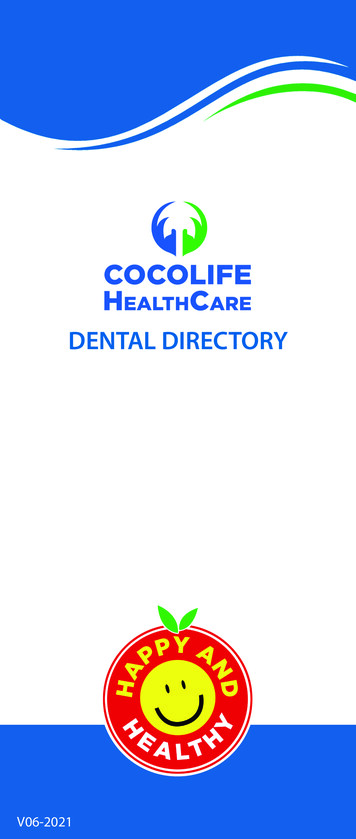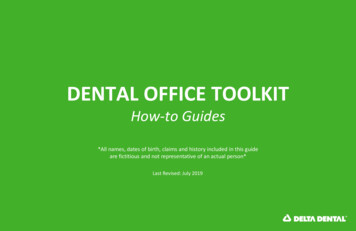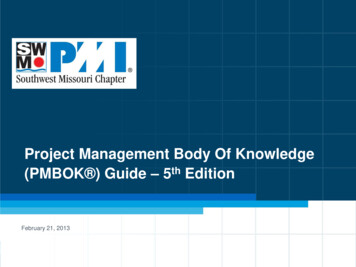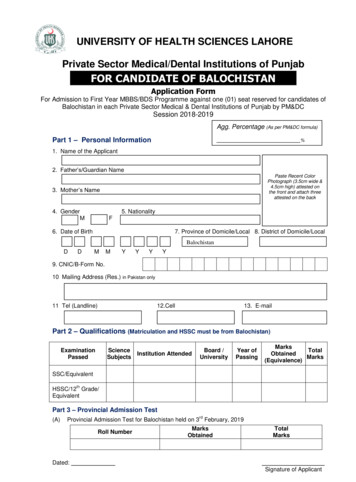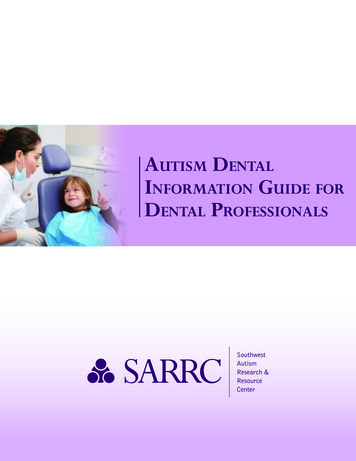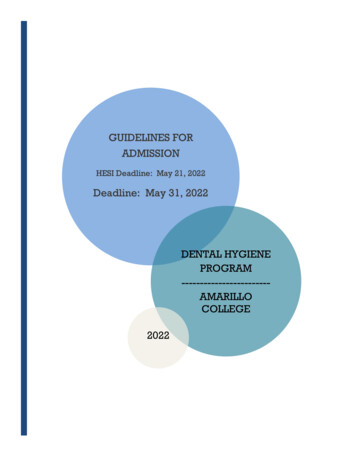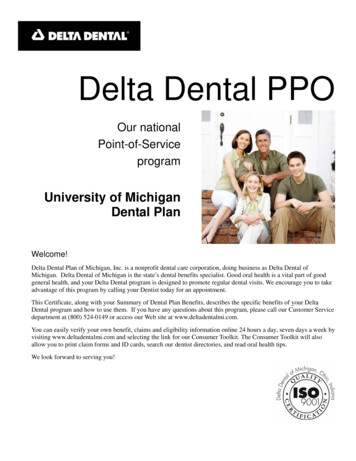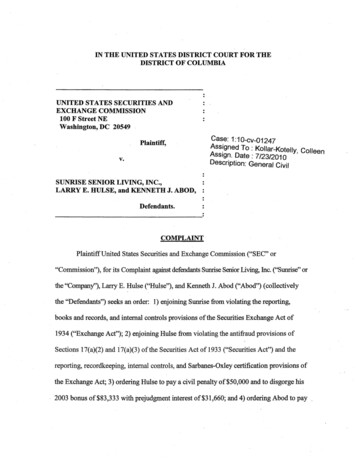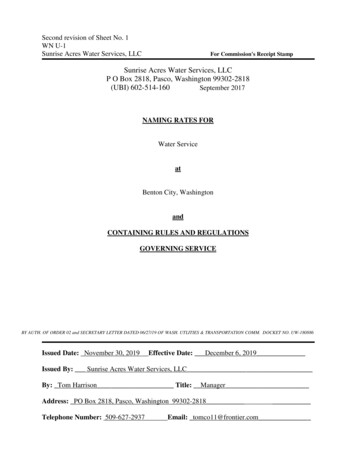
Transcription
Information Summary and RecommendationsDental Care Scope of PracticeSunrise ReviewJanuary 2004Health Systems Quality Assurance
Information Summary and RecommendationsDental Care Scope of PracticeSunrise ReviewJanuary 2004For more information or additionalcopies of this report contact:Office of the Assistant SecretaryPO Box 47850Olympia, Washington 98504-7850Phone: (360) 236-4605Fax: (360) 236-4626Mary C. SeleckySecretary of Health
PageContents1Executive Summary3Department’s Findings6Detailed Recommendations11Information SummaryAppendix: AApplicant ReportAppendix: BPublic Hearing SummaryAppendix: CParticipant ListAppendix: DReference consultedAppendix: EApplicant’s Proposed LegislationAppendix: FRebuttal Statements
EXECUTIVE SUMMARYBackgroundHouse Bill (draft) H-3273.2 was referred to the Department of Health for a sunrise review in thesummer of 2003. The bill would amend the regulation of dental hygienists, including expandingunsupervised practice; establish regulation of dental assistants at the registration and certificationlevels; create a dental hygiene committee under the Dental Care Quality Assurance Commission forpurposes of regulating hygienists; and make amendments to various practice acts to place hygienists,assistants, dentists and denturists under one practice act chapter of state statute.The applicant for this proposal is Representative Eileen Cody.CURRENT REGULATIONDentists are regulated at the level of licensure by the Dental Care Quality Assurance Commission.Dental Hygienists are regulated at the level of licensure and must be supervised by a dentist exceptin limited settings. Regulation is performed primarily by the department, except for theexamination, which is handled by an exam committee. Dental Assistants are not defined in statuteand are referred to in department rules as “unlicensed persons.” A dentist is responsible for theactions of the assistant. Denturists became regulated as a result of the Initiative process and arealso licensed. Denturists are regulated by their own board.To be licensed in this state, dental hygienists must take and pass the “restorative” examination.Washington is the only state that requires this knowledge; applicants from other states must attenda course at their own expense (including housing, etc.) for three weeks and then pass the test. An18 month “temporary license” is available that allows out of state applicants to work as hygienistswhile attaining this knowledge and taking the exam. If they do not successfully do so, they losethe opportunity to work after 18 months.RECOMMENDATIONS TO THE LEGISLATURE (DETAILED RECOMMENDATIONS ANDRATIONALE BEGIN ON PAGE 6)1. Dental assistants should be required to register. While the department supports the conceptof “expanded practice certified dental assistants” there was insufficient information uponwhich a firm recommendation could be made. If registration is enacted by the legislature,the Department would undertake a further study to develop a scope of practice for expandedpractice certified dental assistants for the legislature to consider. Sufficient staffing andallotment authority should be allowed to properly implement this recommendation.2. Dental assistants should not be allowed to perform supragingival or subgingival scaling.3. Dental hygienists should be allowed to work unsupervised in any setting, if they have twoyears of practical clinical experience, supervised by a dentist, in the previous 5 years. Their1
scope of practice should still include a prohibition on the unsupervised administration ofnitrous oxide or legend drugs.4. Denturists, dentists and dental hygienists should supervise registered Dental Assistants.Supervision requirements should be comparable under each professional. Denturists,dentists and hygienists may only allow assistants to perform tasks for which they areproperly trained, and may not allow an assistant to perform functions outside of thesupervisor’s scope of practice.5. A “limited” dental hygienists license should be created that will allow out of stateapplicants to obtain a Washington license without taking additional training and anexamination in restorative services.6. The Dental Hygiene Examining committee should be replaced with a Dental HygieneBoard appointed by the Secretary. The new board should be responsible for examinationrequirements, licensing standards and scope of practice issues, and consult with the DentalCommission when appropriate. The Secretary of Health should be the disciplining andlicensing authority for dental hygienists. The Board should have 6 members; 5 hygienistsand 1 public member. Sufficient staffing and allotment authority should be allowed toproperly implement this recommendation.7. The overall structure of the dental professions’ statutes does not need to be consolidated.Dental assistant regulation, if passed, should be incorporated as 18.31 RCW.8. While not part of the original applicant proposal, the review process identified additionaltraining requirements for dentists who supervise nurses (most notably certified registerednurse anesthetists) who provide anesthesia services in dental offices. The Departmentrecommends that the portion of the WAC requiring this additional training be repealed.2
FINDINGS1.Washington State is facing a shortage of dental hygienists and dentists. Currently, 35 of 39counties have some area or population designated as a “Dental Health Professional ShortageArea.” (ww4.doh.wa.gov/gis/standard maps.htm) The ability to recruit and retain dentists inrural areas has become increasingly difficult. Many dentists now ready to retire are unable tofind someone to take over their practice. Newly trained graduates from the University ofWashington Dental Residency Program totals only 51 per year. The problem is particularlyacute in critical shortage areas, and will likely grow worse as a large percentage of dentistsapproach retirement age. Because a dentist must supervise the work of a hygienist (in mostcases) there is a direct impact on hygienists from shortages of dentists.2.While the proposal seeks to increase the supply of dental care providers, it is not necessaryunder the sunrise criteria for the proponent to prove this. The criteria only require that the newregulatory structure assure the public of initial and continuing competency, and that theprofessionals are trained to meet the standards established. Expanding access could beconsidered a “benefit to the public” under the criteria.3.As stated in the American Dental Association’s Health Policy Resources Center report onDental Workforce issues, issued in 2001:“Many factors affect the required number of dentists. The availability of auxiliary dentalpersonnel is critical. Unless trends change, there could be increasing difficulty in attractingstudents to dental assisting and dental laboratory technology programs. Retention issuesrelated to dental hygiene could continue unless some action is taken.”4.Dental hygienists are regulated by the Department for practice and disciplinary matters. TheDental Hygiene Examining Committee, with 4 members, has independent authority for thelicensing examination. The Dental Quality Assurance Commission (DQAC) regulates dentistsfor both licensing and disciplinary activities. The Commission has 14 members. The Board ofDenturists regulates denturists. It has 7 members. There are 5378 dentists, 4431 dentalhygienists, and 123 denturists with active credentials. The Washington State Dental AssistantAssociation estimates there are 4000 dental assistants in Washington state. The DentalAssistant National Board (DANB), which provides a private certification for assistants, reports1040 assistants in Washington have attained their credential.5.Several states allow some degree of unsupervised dental hygiene practice. One state,Colorado, has allowed completely unsupervised hygiene practice for about 10 years.Representatives from the state of Colorado reported to the Department that this program isworking well, with little or no disciplinary action against the hygienists. Thirty-one hygienists(out of 3,493) practice in settings by themselves. A 1998 study of 6 hygienists in independentpractice concluded that “the services provided were consistent with allowable services” andthat compliance “was verified” by office visits and patient records. Unsupervised practice wasfound to “not exhibit any undue risk to the health and safety of the public.” The University ofCalifornia School of Dentistry studied a pilot project in California for unsupervised practice.The 1997 study concluded that this practice “did not increase the risk to the health and safety ofthe public.”3
6.In Washington, dental hygiene unsupervised practice is limited to a variety of health careinstitutions, such as nursing homes. With the passage of SSB 6020 in 2001, unsuperviseddental hygienist are allowed to apply sealants and fluoride varnish in school-based programs incoordination with local health jurisdictions or local oral health coalitions.7.Washington’s scope of practice for dental hygienists, which includes placing of restorations, isa unique scope of practice among the states. (A few states allow placing of restoratives under“advanced practice.”) Out of state applicants, therefore, must take a course and pass anexamination in this function before being licensed by Washington. An 18-month period isallowed for a temporary license, allowing the applicant to meet the additional requirements.Only about 30% of hygienists use the restorative function as part of their actual practice. TheDepartment has identified this is an unnecessary barrier to licensing and is proposinglegislation to provide for a “limited license” for those hygienists who do not want to practicerestorative and therefore would not be required to take the education or exam.8.It is possible that unsupervised practice of hygienists will allow this type of provider to workmore closely with local health jurisdictions in the delivery of oral health care under programsalready authorized by the legislature.9.The American Dental Association requirements for accreditation of dental hygiene schoolscontain, among other things, the inclusion of “dental hygiene diagnosis” as a competencyrequired of graduates.10.Dental assistants are currently not directly regulated by the State of Washington. Assistants areregulated through the close supervision of the licensed dentist. Dentists may delegate certainfunctions to an assistant if the dentist is sure they are properly trained. Some functions may notbe delegated. Some other states regulate assistants at registered, certified or licensed levels.11.The Dental Assisting National Board (DANB), a private certification organization, is currentlyreviewing the expanded functions of dental assistants in other states. This survey is notexpected to be completed until sometime in 2004.12.The typical higher-education dental assistant program includes 10-12 months of clinicaltraining, including radiology, CPR and delivery of care coursework.13.In 1994, the Department conducted a sunrise review of a proposal to regulate dental assistantsand to allow them to perform “expanded functions.” The proposal also called for unsupervisedpractice of dental hygienists, and included proposed changes to the structure of the regulatoryentities involved. At that time, the Department recommended that assistants be allowed, undercertain circumstances, to perform expanded functions, although it did not endorse a registrationor certification program. Recommendations included allowing unsupervised dental hygienepractice, regardless of settings, after receiving an endorsement, showing 2 years of experienceunder supervision. Composition of the Dental Quality Assurance Commission wasrecommended as 1 dental assistant, 3 dental hygienists, 3 public members and 11 dentists; thedental hygiene examining committee would have been abolished. There were other relatedtechnical and administrative changes.14.Several things have changed since the previous Sunrise Review (see #13 above). For example,the potential for shortages of several types of providers has increased. Technology4
developments and scientific advances in dental services have made the dental office morecomplex. The Department has instituted a criminal background check of all credential categoryapplicants, giving an extra measure of public protection to any level of regulation (includingregistration). The science behind oral health has evolved, and there is now a betterunderstanding of the relationship between oral and general physical health.15.In 2002, the state of Colorado conducted a sunrise review of a proposal to provide “titleprotection” to “expanded functions dental assistants.” Those assistants with advanced skillscould be certified. This is similar to the certification part of the applicant’s proposal. Thereview concluded that the proposal did not meet the sunrise criteria (which are identical toWashington’s). This was based on lack of evidence indicating harm or potential harm existsfrom the unregulated practice of expanded functions dental assistants, and that privatecertification through DANB is a cost-effective alternative to state regulation.16.The State of Texas Sunset Advisory Committee issued a report in February 2002 thatconcluded, among other things, that “regulatory controls over dental assistants are not adequategiven their patient care responsibilities.” This conclusion was based, in part, on the finding thatassistants may perform procedures that put patients at risk, and that some dentists and assistantsare unclear on what duties an assistant is allowed to perform.17.In May 2000, the Surgeon General of the United States issued a report on Oral Health. Amongthe findings relevant to this report are those relating oral health to general health. The findingsinclude:Many systemic diseases and conditions have oral manifestations. These manifestationsmay be the initial sign of clinical disease and as such serve to inform clinicians andindividuals of the need for further assessment.The oral cavity is a portal of entry as well as the site of disease for microbial infectionsthat affect general health status.Animal and population-based studies have demonstrated an association betweenperiodontal diseases and diabetes, cardiovascular disease, stroke, and adverse pregnancyoutcomes.18.Department of Health disciplinary complaints against dentists reveal that from 1999 throughOctober 2003, there were only 16 cases of “aiding and abetting unlicensed practice.” Not all ofthese are necessarily attributable to problems with dental assistants and only 3 resulted indisciplinary action.19.Department of Health disciplinary complaints against dental hygienists reveal that fromOctober 1998 through October 2003 there were only 7 standard of care concerns. Not all ofthese are necessarily attributable to problems with supervision requirements and only 2 resultedin disciplinary action.5
DETAILED RECOMMENDATIONS TO THE LEGISLATURE1. Dental assistants should be required to register. While the department supports the concept of“expanded practice certified dental assistants” there was insufficient information upon which afirm recommendation could be made. If registration is enacted by the legislature, theDepartment would undertake a further study to develop a scope of practice for expandedpractice certified dental assistants for the legislature to consider. Sufficient staffing andallotment authority should be allowed to properly implement this recommendation.Rationale:The complexity of dental care has increased significantly in the last 10 years. At the same time, thescientific knowledge has evolved, including a better understanding of the relationship between oral andgeneral physical health. This requires the regulatory system to require more accountability, technicalknowledge and competency from oral health providers. Establishing a “base” of registration for dentalassistants is an important part of the regulatory scheme. First, the criminal background check,conducted on all credential applicants, adds a layer of protection. Second, registration aids the dentistin the hiring practice by preventing assistants who have been disciplined from working in anotheroffice.In addition, potential shortages of dentists and hygienists compel consideration of methods to increasesafe, appropriate use of auxiliary personnel such as dental assistants. Registration puts the assistantsunder the Uniform Disciplinary Act. This will help prevent an assistant who should not be practicingfrom moving from one dental office to another. It also reflects the reality that some assistants haveinformal training (primarily on the job) and there would be no easy way to evaluate that training forpurposes of regulating at a higher level.A certification option allows those who seek to perform expanded functions to have their advancedtraining recognized. This assures the public of their initial competency and allows the dentist to moreconfidently delegate tasks to the assistants. However, given the time needed to compile a list of whatother states are allowing, and what the Dental Assisting National Board finds in its survey, there isinsufficient basis to formulate a certification program in statute at this time.2. Dental assistants should not be allowed to perform supragingival or subgingival scaling.Rationale:Because data show that approximately 75% of patients have both supra- and subgingival calculus,most patients being treated by assistants performing supragingival scaling would have to also see ahygienist. Separating out the scaling function by the area to be scaled is an inefficient use of officepersonnel, and is inconvenient, at best, for the patient.There is evidence that potential for harm exists from scaling below the gingiva, thereby making thisapproach unsafe for the patient if not performed by a fully trained practitioner.6
The Department concurs with the Washington State Dental Assistants Association conclusion thatthere is “no need to impinge on an area that should remain the domain of a trained hygienist.”3. Dental hygienists should be allowed to work unsupervised in any setting, if they have two yearsof practical clinical experience, supervised by a dentist, in the previous 5 years. Their scope ofpractice should still include a prohibition on the unsupervised administration of nitrous oxide orlegend drugs. No other changes to the scope of practice of dental hygienists are needed at thistime.Rationale:Over the years, the Department has maintained that hygienists are capable of practicing independently.Hygienists are important preventive care providers, and a key to the long-term improvement in oralhealth status in the state.The history with the limited settings in which hygienists do practice unsupervised has demonstratedthat the training they receive, and the requirement for a two-year minimum of previous supervisedexperience, is sufficient for safe practice. The experience of Colorado’s unsupervised practice, andtwo scientific studies, confirms this as well.The bachelor’s degree requirement for allowing unsupervised practice, as contained in the proposal,has not been justified. The additional education in the final two years of the degree programs generallydoes not relate to hygiene care but to more “elective” courses. Further, the current standard of twoyears of experience has proven to be adequate; licensing standards are to be set at the minimum levelrequired for safe care. Obtaining a bachelor’s degree may be optimal but does not need to be alicensing standard.The proposed changes to the hygienist’s scope of practice, which were characterized in testimony as“updates” seem to be significant changes. The Department could not find justification or need forthese changes, nor was sufficient information provided to assure that training opportunities wereadequate to prepare hygienists for these changes.While a result of this change may only be a modest increase in availability of dental hygienepreventative services in underserved areas, removing any regulatory barrier to increase access isdesired when patient harm is not compromised. Other barriers may also exist, such as reimbursementpolicies and rates.4. Denturists, dentists and dental hygienists should supervise registered Dental Assistants.Supervision requirements should be comparable under each professional. Denturists, dentistsand hygienists may only allow assistants to perform tasks for which they are properly trained,and may not allow an assistant to perform functions outside of the supervisor’s scope ofpractice.Rationale:7
Dental hygienists who may practice unsupervised could benefit from the services of a registeredassistant. This would benefit the patient through a more smoothly functioning office. If unsupervisedhygienist practice is not enacted, patients could still benefit from registered assistants being supervisedby hygienists.Denturists could also benefit from the services of a registered assistant, and the public would benefitfrom knowing that the assistants are regulated by the state.5. A “limited” dental hygienists license should be created that will allow out of state applicants toobtain a Washington license without taking additional training and an examination inrestorative services.Rationale:The shortage of health care workers led the Department of Health (DOH) to examine its professionallicensing laws for barriers to licensure. Unnecessary barriers were identified and legislative changesdeveloped to correct them. In 2004, the department will request legislation to establish a “limitedlicense” for hygienists which would allow practice without restorative services. DOH has continued toidentify changes to licensure requirements that will eliminate unnecessary provisions and streamlineprocesses.The creation of a limited license will allow hygienists who want to exclude restorations from theirscope of practice to more easily become licensed in Washington. This would give hygienists a choiceof licenses since only approximately 30% of the 4296 licensees actually place restorations.Washington State is the only state that allows hygienists to place restorations. Currently, hygienistsmoving to Washington have 18 months to complete a class on restoration and pass an exam or theycannot become licensed. The limited license would allow hygienists to become licensed without theadditional expense of the class, travel time, and the exam.The Washington scope of practice is a barrier to out of state hygienists working in this state. Theproposed extension of the temporary license allows the hygienist additional time to train and test forthe license. The limited license is a better option, as it would eliminate the unnecessary time andexpense to hygienists for training and testing they will not utilize.The limited license will reduce barriers to licensure and increase the numbers of providers.6. The Dental Hygiene Examining committee should be replaced with a Dental Hygiene Boardappointed by the Secretary. The new board should be responsible for examinationrequirements, licensing standards and scope of practice issues, and should consult with theDental Commission when appropriate. The Secretary of Health should be the disciplining andlicensing authority for dental hygienists. The Board should have 6 members; 5 hygienists and 1public member. Sufficient staffing and allotment authority should be allowed to properlyimplement this recommendation.Rationale:8
The current Dental Hygiene Examining Committee has full authority over the examination portion ofthe regulation of hygienists. It has also assumed a de facto advisory role to the department in scope ofpractice and licensing issues. The new Board will not have licensing or disciplinary authority but willhave added responsibility in non-exam areas.The use of a board with this kind of authority is consistent with other programs for professionsinvolving unsupervised practice. The board structure proposed for dental hygiene is similar to that ofthe State Board of Massage and the Board of Denturists. It utilizes the expertise of the dentalhygienists in matters of scope, standard of care, and testing, while preserving the efficiency of a morestreamlined licensing and disciplinary process.The applicant’s proposed structure of a subcommittee under the Dental Commission appearsinefficient, complicated and time-consuming. For example, if an applicant had something appear onthe background check, staff would be required to get the committee to decide on what action, if any, totake in relation to the application; then the Commission would have to approve the decision. Theprofessional expertise represented by the hygienists is better used in more technical matters.The applicant’s proposal will be more expensive than the current operation of the dental hygieneexamining committee. The proposal would also require more meetings of the Committee on DentalHygiene to accomplish all the duties assigned in the legislation. The increased membership will alsocontribute to increased costs. The increased workload on the Commission will increase costs for itsoperation.7. The overall structure of the dental professions’ statutes does not need to be consolidated.Dental assistant regulation, if passed, should be incorporated as 18.31 RCW.Rationale:The Department could not determine a significant difference in either leaving the statutes separated orconsolidated into one. A consolidation would likely increase some short-term costs of regulating theprofession – for changes to administrative rules, web pages, printed materials, etc. In additional, theremay be some short-term confusion among the public having different sets of materials, citing differentWAC numbers.Under the sunrise criteria, it is not possible to make a strong recommendation either way on this part ofthe applicant’s proposal. Therefore, the Department has chosen to recommend that it be considered anunnecessary change.Currently, the statutes governing the oral health care professions are consolidated into a singlelawbook for ease of use by the licensees.8. While not part of the original applicant proposal, the review process identified additionaltraining requirements for dentists who supervise nurses (most notably certified registered nurseanesthetists) who provide anesthesia services in dental offices. The Department recommendsthat the portion of the WAC requiring this additional training be repealed.9
Rationale:Requiring a dentist to be fully trained in anesthesia services in order to allow a CRNA to provideanesthesia services is inefficient and unnecessary. CRNAs are fully trained and can legally provideunsupervised services in other settings. This recommendation is also consistent with the Governor’srecent decision regarding the ability of CRNAs to work unsupervised in the hospital setting.There should not be any additional training for dentists when using the anesthesia services of a nonphysician. Any anesthesia provider who can otherwise legally practice unsupervised should beallowed to provide services in a dental office.10
INFORMATION SUMMARYNOTE: This is not an attempt to quote or paraphrase every participant in the review, but rather to summarizethe key points provided to the department in the process. All points were considered in developing therecommendations.Applicant(Full applicant report can be found in Appendix B)The primary points of the proposal are that it: combines the regulation of all oral health care professionals under a single chapter;requires dental assistants to be either registered or certified;allows dental hygienists to obtain an endorsement to practice independent of dentalsupervision; andestablishes a subcommittee on dental hygiene practices to regulate the practice of dentalhygiene in coordination with the Dental Quality Assurance Commission.One factor that limits the ability of dentists to see more patients is the availability of dental hygienists.Compared with the rest of the country, Washington faces a significant shortage of dental hygienists. Arecent report estimated that, while Washington dental hygienist programs graduate almost 150 newprofessionals into the field each year, it will require that 360 new dental hygienists enter the practiceevery year for the next ten years to eliminate vacancies and keep up with population growth.Dental assistants fill an important role in the dental office practice model. Washington ranks secondin the nation for having the most dental assistants per dentist. Despite their significance, currentstatutory provisions generally fail to acknowledge the existence of dental assistants, much less regulatetheir practice. Furthermore, if the predicted scarcity of dentists and dental hygienists shouldmaterialize, then there will likely be an increased dependence on dental assistants. Having themrecognized through registration and certification can protect the public by ensuring that they are notworking beyond their scope of practice and modifying that scope of practice if their skills allow.Lastly, the current lack of oral health professionals is harming the public. An incremental regulatoryscheme consisting of both registration and certification for dental assistants can create career ladders toattract people to the profession, retain them, and encourage them to continue their education so thatthey may provide more skills to the public.The potential harm that dental hygienists present to patients is minimized by the training and on-thejob supervision that they receive. Even though this proposal removes the protection of supervision, itis believed that any potential harm that this poses can be offset by the fact that the dental hygienistswho will practice independently must have received their training from a baccalaureate program. Ifthere are other safeguards
Dental Care Scope of Practice Sunrise Review January 2004 For more information or additional copies of this report contact: Office of the Assistant Secretary PO Box 47850 Olympia, Washington 98504-7850 Phone: (360) 236-4605 Fax: (360) 236-4626 Mary C. Selecky Secretary of Health .
